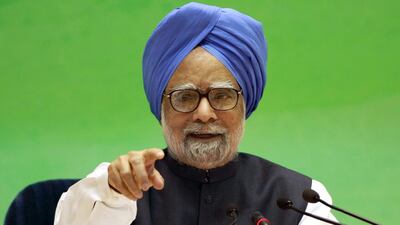NEW DELHI // Posterity has always been a refuge for political leaders leaving office with less than glowing notices.
India’s prime minister Manmohan Singh proved no exception last week, telling reporters he would leave it to that conveniently faceless tribunal to evaluate his decade-long tenure as premier.
“I have done as well as I could do according to the circumstances,” said Mr Singh, 81. “It is for history to judge what I have done or what I have not done.”
In the long run, history may well regard Mr Singh kindly. But in the short term, the public’s sense of disappointment and frustration with him and his Congress party is inescapable. The party faces a likely rout in elections due early this summer, mainly because Mr Singh’s government has earned a reputation for inefficiency and corruption.
The sour national mood is a stark contrast to the hopefulness that first welcomed him into power, after the election in 2004. Mr Singh was the Congress’s surprise choice to be prime minister, elevated past not only other veteran politicians but even Sonia Gandhi, the party’s president.
Mr Singh had been known as an Oxford-trained economist who, as finance minister in the early 1990s, liberalised India’s economy, opening it up to foreign investment and trade. He had the image of a perfect technocrat: quiet, incorruptible and serious about economic reform.
“He could walk out any day, and he will not suffer,” the economist Meghnad Desai, who knows Mr Singh, told me in December 2004. “He is not dependent on patronage, and he is not going to kowtow to anybody. Manmohan cannot be bossed around.”
The arc of Mr Singh’s life is remarkable. The son of a dry-fruits trader in a small village in what is now Pakistan, he succeeded by dint of diligence and acumen, completing a doctorate at Oxford and then rising swiftly through India’s bureaucracy.
Mr Singh’s first government – a coalition headed by the Congress and lasting from 2004 to 2009 – could be considered something of a success.
It pushed through parliament an act that guaranteed 100 days of employment a year to the rural poor, putting them to work on local infrastructure projects. Another law enabled citizens to file “right to information” requests and demand access to government documents.
Mr Singh also signed a civilian nuclear agreement with the United States, ending years of sanctions following India’s tests of nuclear weapons in 1974 and 1998. The deal was “the best moment for me”, Mr Singh told reporters on Friday after announcing he would not bid for the primiership again.
On the crest of winning re-election in 2009, Mr Singh’s government made education free and compulsory for children between the ages of six and 14.
Yet many of the measures touted as successes by Mr Singh and his allies have come under criticism.
The rural employment guarantee act is often derided as another way for corrupt officials to line their pockets while the poor build poor-quality infrastructure. School facilities in India – and, in fact, most infrastructure – remain abysmal.
The economic reforms that had been anticipated under his prime ministership remained unfulfilled.
The World Bank’s estimate that 137 million Indian were lifted out of poverty between 2005 and 2012 has been contradicted by India’s own federal planning commission, which puts the figure at only 32.4 million. The rate of economic growth has slipped from double digits to an estimated 4.7 per cent for the 2013-14 financial year.
What has done Mr Singh’s image most harm, however, is the string of corruption scandals involving government officials. Fraud and graft have been so rife that it is difficult, if not impossible, to believe that Mr Singh was not aware of at least some of it as it occurred.
In 2011, a US state department cable released by WikiLeaks indicated that his government may have bribed two opposition members of parliament to vote in its favour. Officials were arrested for kickbacks in the awarding of contracts for the Commonwealth Games in 2010, which took place in Delhi.
A telecommunications minister resigned and is now standing trial for selling the rights to the country’s mobile phone spectrum to companies he favoured. The coal ministry, which was under Mr Singh’s direct purview for several years, is under investigation for favouritism in the allocation of mining rights.
In both cases, the government lost billions of dollars in revenue, according to estimates by India’s auditor general.
Throughout his premiership, Mr Singh has remained a likable person. Although his opponents accuse him of being incommunicative and of being too malleable in Ms Gandhi’s hands, they rarely have called his integrity into question.
Still, historians will debate his legacy and whether he has left the country worse off than when he entered office in 2004. And Indian voters, with their shorter memories and more immediate concerns, are unlikely to give him a teary sendoff this summer.
ssubramanian@thenational.ae

